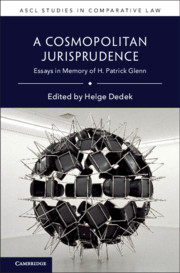Book contents
- A Cosmopolitan Jurisprudence
- ASCL Studies in Comparative Law
- A Cosmopolitan Jurisprudence
- Copyright page
- Epigraph
- Contents
- Foreword
- Acknowledgements
- Notes on Contributors
- Images
- Introduction
- Part I The Tradition of Comparative Law
- 1 How to Do Comparative Law: Some Lessons to Be Learned
- 2 The ‘Comparative Method’ at the Roots of Comparative Law
- 3 The Value of Micro-Comparison
- 4 Sociocultural Challenges for Comparative Legal Studies in Mixed Legal Systems
- 5 Breaking Barriers in Comparative Law
- Part II The Concept of Tradition
- Part III Crossing Boundaries
- H Patrick Glenn Publications
- Index
2 - The ‘Comparative Method’ at the Roots of Comparative Law
from Part I - The Tradition of Comparative Law
Published online by Cambridge University Press: 10 December 2021
- A Cosmopolitan Jurisprudence
- ASCL Studies in Comparative Law
- A Cosmopolitan Jurisprudence
- Copyright page
- Epigraph
- Contents
- Foreword
- Acknowledgements
- Notes on Contributors
- Images
- Introduction
- Part I The Tradition of Comparative Law
- 1 How to Do Comparative Law: Some Lessons to Be Learned
- 2 The ‘Comparative Method’ at the Roots of Comparative Law
- 3 The Value of Micro-Comparison
- 4 Sociocultural Challenges for Comparative Legal Studies in Mixed Legal Systems
- 5 Breaking Barriers in Comparative Law
- Part II The Concept of Tradition
- Part III Crossing Boundaries
- H Patrick Glenn Publications
- Index
Summary
In the past two decades comparative law scholars have rediscovered the importance of the debate on method. For a long time left in the background as a by-product of the old controversy on the epistemic status of the discipline, the ‘struggle for the methods’ has experienced a sudden revival. But does it really make sense to keep on engaging in a wearying confrontation among the various possible paradigms, once one recognizes that, as Patrick Glenn observed, ‘the history of comparative law is not one of adherence to a methodological norm but rather one of deviation and variety’? It makes sense, indeed, because ‘eclecticism’ as a theoretical perspective is itself the sign of the times and cannot strive for universal validity. Looking back at the history of comparative law, one is struck by the circumstance that throughout the formative era, the idea that obtained most credit in European intellectual circles was the opposite one, namely that ‘there is a comparative method’ (rectius: ‘Comparative Method’, as it was once written). This chapter is aimed at bringing back to light some distinctive traits of the original discourse on the ‘comparative method’ and highlighting the importance of the ‘scientific paradigm’ for the acceptance of comparative law as an autonomous subject of legal research.
Keywords
- Type
- Chapter
- Information
- A Cosmopolitan JurisprudenceEssays in Memory of H. Patrick Glenn, pp. 44 - 63Publisher: Cambridge University PressPrint publication year: 2021
- 4
- Cited by

